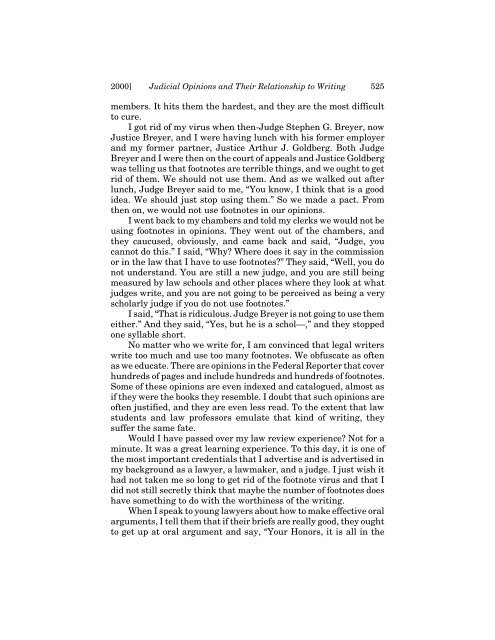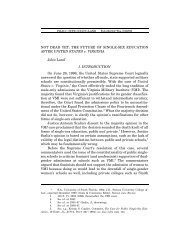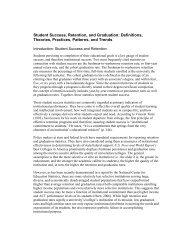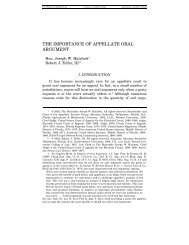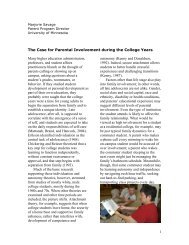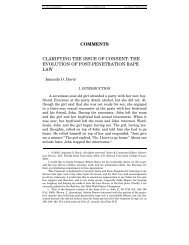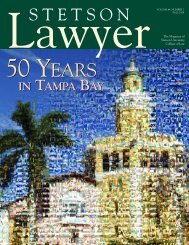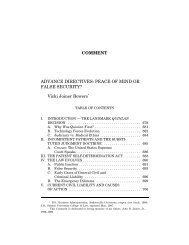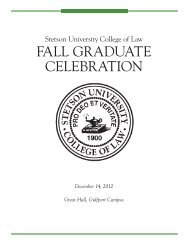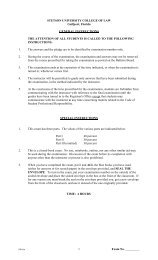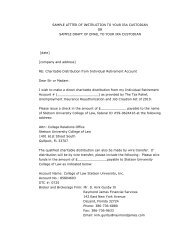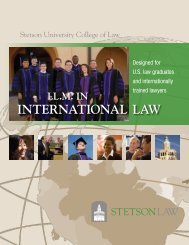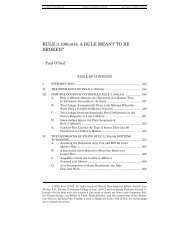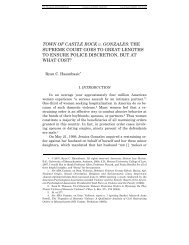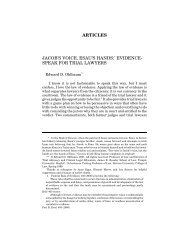Law Reviews, Judicial Opinions, and Their Relationship to Writing
Law Reviews, Judicial Opinions, and Their Relationship to Writing
Law Reviews, Judicial Opinions, and Their Relationship to Writing
Create successful ePaper yourself
Turn your PDF publications into a flip-book with our unique Google optimized e-Paper software.
2000] <strong>Judicial</strong> <strong>Opinions</strong> <strong>and</strong> <strong>Their</strong> <strong>Relationship</strong> <strong>to</strong> <strong>Writing</strong> 525members. It hits them the hardest, <strong>and</strong> they are the most difficult<strong>to</strong> cure.I got rid of my virus when then-Judge Stephen G. Breyer, nowJustice Breyer, <strong>and</strong> I were having lunch with his former employer<strong>and</strong> my former partner, Justice Arthur J. Goldberg. Both JudgeBreyer <strong>and</strong> I were then on the court of appeals <strong>and</strong> Justice Goldbergwas telling us that footnotes are terrible things, <strong>and</strong> we ought <strong>to</strong> getrid of them. We should not use them. And as we walked out afterlunch, Judge Breyer said <strong>to</strong> me, “You know, I think that is a goodidea. We should just s<strong>to</strong>p using them.” So we made a pact. Fromthen on, we would not use footnotes in our opinions.I went back <strong>to</strong> my chambers <strong>and</strong> <strong>to</strong>ld my clerks we would not beusing footnotes in opinions. They went out of the chambers, <strong>and</strong>they caucused, obviously, <strong>and</strong> came back <strong>and</strong> said, “Judge, youcannot do this.” I said, “Why? Where does it say in the commissionor in the law that I have <strong>to</strong> use footnotes?” They said, “Well, you donot underst<strong>and</strong>. You are still a new judge, <strong>and</strong> you are still beingmeasured by law schools <strong>and</strong> other places where they look at whatjudges write, <strong>and</strong> you are not going <strong>to</strong> be perceived as being a veryscholarly judge if you do not use footnotes.”I said, “That is ridiculous. Judge Breyer is not going <strong>to</strong> use themeither.” And they said, “Yes, but he is a schol—,” <strong>and</strong> they s<strong>to</strong>ppedone syllable short.No matter who we write for, I am convinced that legal writerswrite <strong>to</strong>o much <strong>and</strong> use <strong>to</strong>o many footnotes. We obfuscate as oftenas we educate. There are opinions in the Federal Reporter that coverhundreds of pages <strong>and</strong> include hundreds <strong>and</strong> hundreds of footnotes.Some of these opinions are even indexed <strong>and</strong> catalogued, almost asif they were the books they resemble. I doubt that such opinions areoften justified, <strong>and</strong> they are even less read. To the extent that lawstudents <strong>and</strong> law professors emulate that kind of writing, theysuffer the same fate.Would I have passed over my law review experience? Not for aminute. It was a great learning experience. To this day, it is one ofthe most important credentials that I advertise <strong>and</strong> is advertised inmy background as a lawyer, a lawmaker, <strong>and</strong> a judge. I just wish ithad not taken me so long <strong>to</strong> get rid of the footnote virus <strong>and</strong> that Idid not still secretly think that maybe the number of footnotes doeshave something <strong>to</strong> do with the worthiness of the writing.When I speak <strong>to</strong> young lawyers about how <strong>to</strong> make effective oralarguments, I tell them that if their briefs are really good, they ought<strong>to</strong> get up at oral argument <strong>and</strong> say, “Your Honors, it is all in the


